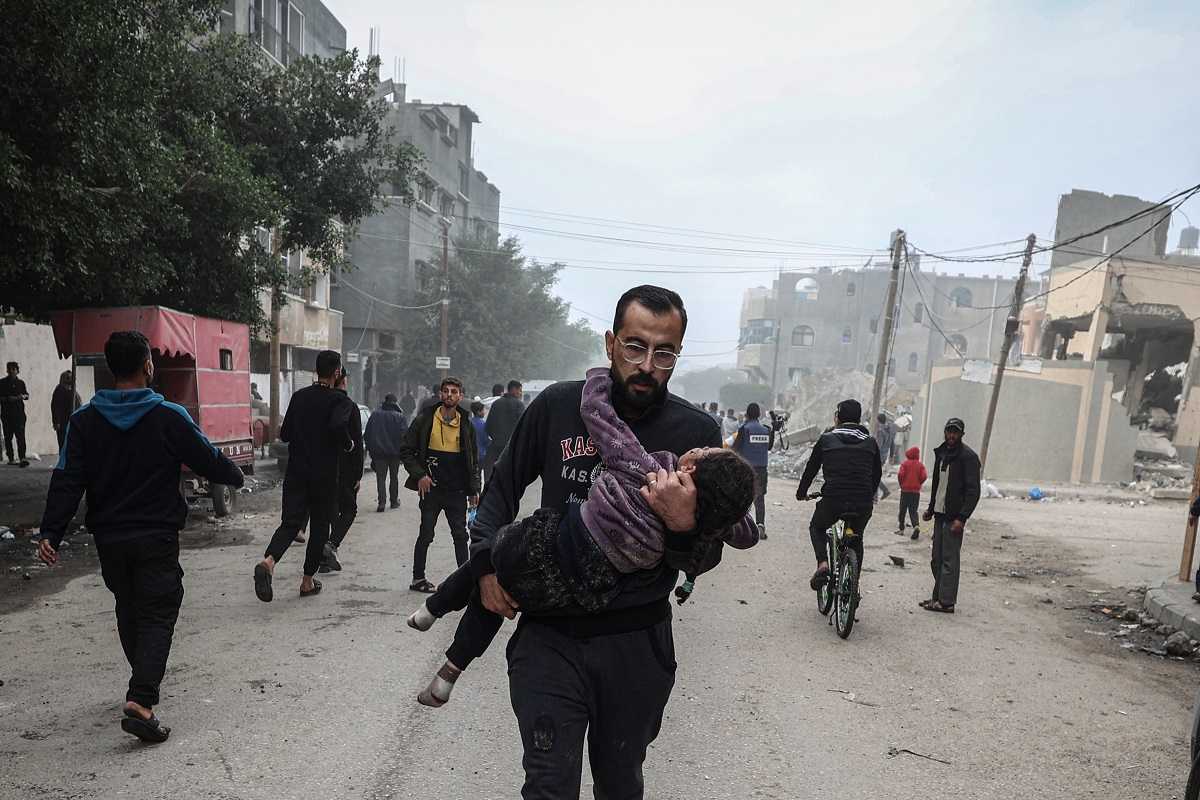
A man carries a child after a mosque is struck in central Rafah, southern Gaza, on Dec. 20.
12:51 JST, December 27, 2023
The U.N. Security Council has called for “urgent and extended” humanitarian pauses in Gaza to allow more aid into the enclave. The United States, Israel’s best friend, says it wants its ally to move from block-flattening airstrikes to operations that target Hamas leaders more precisely.
But in recent days, Prime Minister Benjamin Netanyahu and Israeli military commanders have suggested that the level of violence with which they’re prosecuting the war – already among the most destructive of the century, and a source of regional instability – will persist or even intensify.
Israeli airstrikes since Christmas Eve have wounded or killed hundreds of Palestinians, many of them in refugee camps, according to Palestinian and international health officials. Nineteen Israeli soldiers have been killed in fighting with militants over the past four days, one of the bloodiest stretches for Israel since it began the campaign it says was aimed at eradicating Hamas on Oct. 7.
The few hospitals that continue to function in Gaza are far beyond overwhelmed, aid officials say.
But the war “isn’t close to finished,” Netanyahu said during a visit to Gaza Monday.
“We are expanding the fight in the coming days,” he said in comments released by his Likud party. “This will be a long battle.”
Defense Minister Yoav Gallant said Tuesday the country has been attacked from “seven different arenas” – Gaza, the West Bank, Lebanon, Syria, Iraq, Yemen, and Iran – since the beginning of the war, and has “responded and acted” in six.
“Anyone who acts against us is a target,” Gallant told the Knesset committee on foreign affairs and security. “There is no one who is immune from this.”
The Security Council last week passed a resolution calling for a second humanitarian pause to provide Gaza’s civilians with a measure of relief. Nearly 21,000 people have been killed in the enclave since Oct. 7; water, food, shelter and medical care are all sharply limited.
To avoid a U.S. veto, council members stopped short of calling for a cease-fire. In the days since, Israel has signaled an escalation of its offensive, pounding central Gaza from the air and directing residents to evacuate to other areas of the strip.
The unrelenting violence has laid bare a contradiction between the Biden administration’s stated commitment to reduce civilian suffering, and its unwavering support for Israel’s campaign against Hamas, a mutual foe. Washington gives Israel weapons for the field and political cover at the United Nations – support that has enabled the offensive to continue.
For each day it does, authorities in Gaza say, hundreds of Palestinians are killed.
Netanyahu, writing in the Wall Street Journal on Monday, said the Gaza war would end when Israel wins, and not sooner. “Hamas must be destroyed, Gaza must be demilitarized, and Palestinian society must be de-radicalized,” he wrote in an op-ed piece.
The Biden administration has pressed for the Palestinian Authority, the governing body in the occupied West Bank, to play a central role in Gaza after the war. Netanyahu bluntly rejected that idea. “The expectation that the Palestinian authority will demilitarize Gaza is a pipe dream,” he wrote.
Lt. Gen. Herzi Halevi, chief of the Israeli general staff, said Tuesday that “There is no magic solutions or shortcuts in the fundamental dismantling of a terrorist organization, except persistent and determined fighting. And we are very, very determined.”
“We will get to the Hamas leadership, whether it takes a week or months.”
Hamas fighters streamed out of Gaza early on Oct. 7 to attack Israeli communities near the enclave. They called around 1,200 people and kidnapped 240 more as hostages. The Israel Defense Forces launched its campaign that day.
Amid increasing tensions between the Biden administration and Netanyahu’s government, a senior Israeli official and close adviser to the prime minister traveled to Washington for meetings Tuesday with Secretary of State Antony Blinken and national security adviser Jake Sullivan.
Ron Dermer, Israel’s minister for strategic affairs and a former ambassador to the United States, planned to hold “face-to-face consultations on a number of matters related to the conflict in Gaza and the return of hostages held by Hamas,” National Security Council spokeswoman Adrienne Watson said in a statement. U.S. officials say they’ve urged Israeli commanders to enter a “new phase” of the war – one in which fewer civilians are endangered.
The Gaza Health Ministry said Tuesday that 20,915 people in the enclave have been killed by the Israeli military since Oct. 7. Two hundred and forty-one were killed between Monday and Tuesday, the ministry said.
The IDF on Saturday and Sunday struck at least three areas in central Gaza, including the Bureij and Maghazi refugee camps and the city of Deir al-Balah, to which Israel on Friday had urged Gazans to flee. At least 80 people were killed in an Israeli strike on a residential block in Maghazi late Sunday, Iyad Abu Zaher, director of al-Aqsa Martyrs Hospital, told The Washington Post on Monday.
The IDF said the incident was under review.
Abeer Dawwas, 31, said she was preparing a meager dinner for her children in the Maghazi camp late Sunday when “large and violent” strikes hit several houses around her.
“Because of extreme fear, I felt that these were my last moments,” she said by phone Monday. “I hugged my children and ran with them to the ground floor. We could hear the neighbors screaming for help.”
“We were not informed of the need to evacuate, and the army did not tell us that this area would be a combat zone and that we would have to flee,” Dawwas said.
Seif Magango, the spokesman for the Office of the U.N. High Commissioner for Human Rights, said the agency is “gravely concerned about the continued bombardment of Middle Gaza by Israeli forces.” The roads connecting refugee camps in the area “have been destroyed, obstructing relief aid from reaching those in need,” he said in a statement, “and shelters and hospitals still minimally operating are critically overcrowded and under-resourced.”
The IDF reported intense ground combat and aerial bombardment in Gaza in recent days, including “close quarter” fighting in Khan Younis in the south and around Gaza City in the north. Fourteen soldiers were killed in the enclave over the weekend. Five more deaths were announced on Monday and Tuesday, bringing the toll to 161.
Palestinian officials said Tuesday that Israel had returned the bodies of 80 people it had held during the Gaza war via the Kerem Shalom border crossing. The Hamas-run government media office said Israel had not identified the bodies or said where they had been taken from. They had been “mutilated,” the media office said in a statement, and there were “clear” indications that organs had been “stolen” from the corpses.
The claims could not be independently verified. The Israel Defense Forces referred questions about the bodies to the Israeli agency for civilian coordination with the Palestinians, which did not immediately respond. The corpses, wrapped in blue body bags, were buried Tuesday in a mass grave.
Paltel, the main Palestinian telecommunications provider, announced another cut in internet and cellular networks across Gaza. Laith Daraghmeh, CEO of the West Bank-based Telecommunications Regulatory Authority, said the outage was caused by a lack of fuel and damage to key infrastructure in Khan Younis by Israeli bombardments.
Gaza has faced ongoing communication outages, and calls frequently don’t go through or drop. Israeli strikes have hindered efforts to fix damaged infrastructure, Daraghmeh said. He called for “urgent intervention by the international community.”
Top Articles in News Services
-

Prudential Life Expected to Face Inspection over Fraud
-

Hong Kong Ex-Publisher Jimmy Lai’s Sentence Raises International Outcry as China Defends It
-

Japan’s Nikkei Stock Average Touches 58,000 as Yen, Jgbs Rally on Election Fallout (UPDATE 1)
-

Trump Names Former Federal Reserve Governor Warsh as the Next Fed Chair, Replacing Powell
-

Suzuki Overtakes Nissan as Japan’s Third‑Largest Automaker in 2025
JN ACCESS RANKING
-

Japan Institute to Use Domestic Commercial Optical Lattice Clock to Set Japan Standard Time
-

Israeli Ambassador to Japan Speaks about Japan’s Role in the Reconstruction of Gaza
-

Man Infected with Measles May Have Come in Contact with Many People in Tokyo, Went to Store, Restaurant Around When Symptoms Emerged
-

Prudential Life Insurance Plans to Fully Compensate for Damages Caused by Fraudulent Actions Without Waiting for Third-Party Committee Review
-

Woman with Measles Visited Hospital in Tokyo Multiple Times Before Being Diagnosed with Disease


























